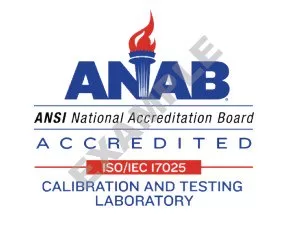Testing Standard:
ASTM F88 Test Method for Seal Strength of Flexible Barrier Materials
Standard Number
ASTM F88
Standard Title
Test Method for Seal Strength of Flexible Barrier Materials
Overview for ASTM F88:
ASTM F88 is a test method that covers the measurement of the strength of seals in flexible barrier materials and can also be conducted on seals between a flexible material and a rigid material. This test method measures the force needed to separate a seal and figures out the mode of specimen failure. Tensile testing seal strength is a method used to measure the strength and durability of seals in various materials. It involves pulling the sealed materials apart at a controlled rate of speed until the seal breaks. The force required to break the seal is recorded and used to determine the seal strength. Tensile testing seal strength is important in industries such as food packaging, pharmaceuticals, and medical devices where the quality of seals can impact product safety and efficacy. It is also used to assess the impact of different sealing methods and materials on seal strength.
Purple Diamond Testing offers ASTM F88 Testing as part of our packaging compliance and validation services. If you would like us to perform other testing services for your packaged products that can be arranged for you. We allow for total comprehensive package testing plans, up to and including any re-design or engineering of your product if necessary.
Rationale for ASTM F88:
Test Method for Seal Strength of Flexible Barrier Materials. It’s intended to be used as a quantitative measurement for process validation, capability, and process control. Seal strength data is not only relevant to opening force and package integrity, but consistency of the seals. This test method is commonly used for validation methods for porous and non-porous heat-sealed medical pouches. Although the maximum seal force is valuable information, the average seal force and the mode specimen failure data could be quite useful. If you have a packaged product that needs to be evaluated, please reach out to one of our packaging experts. Evaluating the seal strength of your packaged goods will help save you thousands overall, ranging from damaged goods costs to packaging re-design and engineering costs. The performance of seals is extremely important today, especially in medical and pharmaceutical seals, considering the level of sensitivity in these kinds of products. The measurement received from the seal strength test will either be enhanced or kept, depending on the validity of the results and current packaging.
Tensile testing seal strength is used to determine the strength of seal bonds between two materials. This testing is important because it allows manufacturers to ensure that their products will perform as expected and meet safety standards. Knowing the seal strength can prevent leaks, contamination, and other problems that may arise in the product’s lifespan. Additionally, retailers and consumers rely on packaging to protect products during transportation and handling, making it essential to test the seal strength. Overall, tensile testing seal strength ensures that the product is reliable, durable, and safe for use or consumption.
The following groups of people or industries may benefit from tensile testing seal strength:
1. Packaging manufacturers: Tensile testing of seal strength can help packaging manufacturers assess the performance of their products and improve their designs. This can lead to the development of stronger and more durable packaging materials.
2. Food and beverage industry: Tensile testing can ensure that food and beverage packaging is tightly sealed to prevent contamination and maintain product freshness. This can improve safety and reduce waste.
3. Medical device manufacturers: Tensile testing of seal strength is important in the development of medical device packaging to ensure that it is secure and sterile.
4. Pharmaceutical companies: Tensile testing can help pharmaceutical companies evaluate the strength of blister pack seals, which can affect the efficacy of the medication inside.
5. Consumer goods industry: Tensile testing can help the consumer goods industry to develop stronger and more secure packaging for products such as electronics, toys, and cosmetics, improving customer satisfaction and reducing returns.
The following are some reasons why tensile testing is used to determine seal strength:
1. Quality control: Tensile testing provides an objective method for evaluating the quality of seals during the manufacturing process and ensuring that they meet the required standards and specifications.
2. Performance: The seal strength of packaging materials is a critical factor that impacts their performance in terms of protection, preservation, and transportation of goods. Tensile testing ensures that the seal can withstand the stresses and strains of the intended application.
3. Regulatory compliance: Many industries such as food, pharmaceuticals, and medical devices require that the packaging materials meet certain standards and regulations. Tensile testing is a standardized method for determining seal strength and allows packaging manufacturers to comply with these regulations.
4. Development: Tensile testing is used in the development of new packaging materials to determine the optimal seal strength. This helps manufacturers to produce packaging that meets the demands of the market and ensures that the seals are strong enough to protect the products during transportation and storage.
5. Cost savings: Tensile testing helps manufacturers to identify any weak spots in the seal and make necessary adjustments to strengthen the seals. This saves money by reducing waste, improving efficiency, and preventing product damage during transportation and storage.
Overall, tensile testing is a useful tool for evaluating the seal strength of packaging materials and ensuring that they meet the required standards for quality and performance.
Key Points:
- Evaluates the performance of seals in medical packaging as well as in consumer goods packaging
- Serves as a quantitative measurement for process validations and process control
- Use ASTM D882 for tensile strength on thin plastic sheeting
- Use ISO 11607-1 for specifications on pass/fail criteria
Related Standards:
- ASTM D882 – Test Method for Tensile Properties of Thin Plastic Sheeting
- ASTM D4332 – Practice for Conditioning Containers, Packages, or Packaging Components for Testing
- ISO 11607-1 – Packaging for Terminally Sterilized Medical Devices – Part 1: Requirements for Materials, Sterile Barrier Systems and Packaging Systems
At Purple Diamond, we offer a free consultation or a guided tour of our facilities. Consultations can be done over the phone or on zoom, so choose what suits you best. To get in touch, go to our Contact Us page and fill out the form or book an appointment using the calendar below. Our goal is to assist you in any way possible, so please don’t hesitate to contact us. Thank you so much for reading down this far and thank you for considering Purple Diamond as your dedicated testing, engineering, and design facility for all of your packaging needs.
Related Testing Standards
- ASTM D642
- ASTM D685
- ASTM D880
- ASTM D951
- ASTM D999
- ASTM D3078
- ASTM D3103
- ASTM D3285
- ASTM D4169
- ASTM D4332
- ASTM D4728
- ASTM D5265
- ASTM D5276
- ASTM D5277
- ASTM D5487
- ASTM D6055
- ASTM D6179
- ASTM D6344
- ASTM D6653
- ASTM D7386
- ASTM F88
- ASTM F1140
- ASTM F1886
- ASTM F1929
- ASTM F1980
- ASTM F2096
- ASTM F2250
- ASTM F3039
- ASTM D1596








